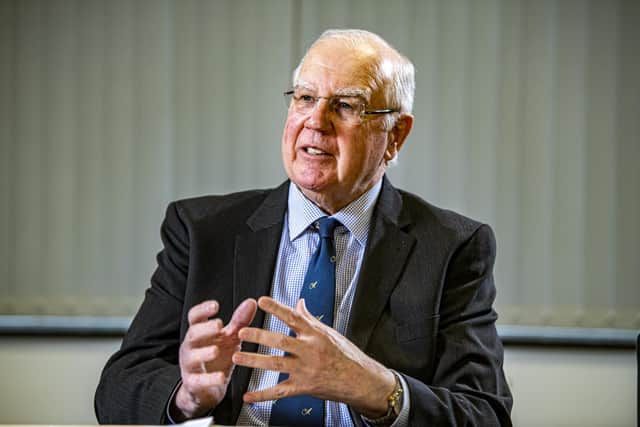NHS has suffered from 'unacceptable reductions' in funding says Sir Alan Langlands
Sir Alan, who ran the health service between 1994 and 2000 and has just been appointed as chair of Yorkshire Cancer Research, said that while he did not wish to be an “armchair pundit” he was concerned about the current state of the NHS.
He said: “I have got the highest respect for people in the health service.
Advertisement
Hide AdAdvertisement
Hide Ad"But there are issues that need to be dealt with. The last 10 years has seen some reductions in funding that are really unacceptable.


“There is an organisation called One Cancer Voice which represents a great number of charities including Yorkshire Cancer Research and they have been very forceful in being clear to Government that we need more funding for cancer in the NHS.
“There are financial problems but the big number one problem is the workload problem.
"What I think is missing is a coherent plan that deals with employer resourcing, recruitment, retention, pay and reward systems, education, training and development.”
Advertisement
Hide AdAdvertisement
Hide AdSir Alan said he “doesn’t know” whether Brexit has contributed to workforce problems in the NHS but there has been a clear impact on social care - with knock-on consequences for hospitals who are unable to release patients fit for discharge.
“The NHS leadership was very outspoken at the time of Brexit saying this is going to be a problem for us and I’m sure there were consequences.
"But there is much clearer evidence of consequences in the social care set-up. State-funded social care needs an injection of money.”
Sir Alan said during the 1990s he had called for annual increases in NHS spending of more than six per cent and said a similar approach is needed now.
Advertisement
Hide AdAdvertisement
Hide Ad“It is all about choices and choices are difficult in the current climate I have no doubt.
"There were issues in the 1990s and I wanted six or seven per cent annual growth.
“We are at the point where there needs to be a substantial infusion.”
According to the King’s Fund, while spending on healthcare has historically grown by around four per cent each year in real terms in the UK, between 2009/10 and 2018/19 the NHS “faced the most prolonged spending squeeze in its history” with average 1.5 per cent increases.
Advertisement
Hide AdAdvertisement
Hide AdA 3.4 per cent rise was agreed for 2019/20 to 2023/24 with a further funding settlement to increase spending by 3.8 per cent agreed in September 2021 in the wake of the pandemic.
Last week, NHS chief executive Amanda Pritchard said the NHS would shortly reveal its new workforce plan, which she described as “a once in a generation opportunity to put the NHS on a sustainable footing”.
A Department of Health and Social Care spokesperson said: “We are prioritising services with up to £14.1bn over the next two years to address the most pressing issues facing the NHS and social care.
“Last week we set out our plan to rapidly reduce waiting times for urgent and emergency care, including increasing capacity with 5,000 more hospital beds and 800 new ambulances.
Advertisement
Hide AdAdvertisement
Hide Ad"We are also reducing pressure on hospitals by scaling up community teams and expanding virtual wards, which allow people to be safely monitored from the comfort of their own home.
“The pandemic had a significant impact on services, but we are focused on delivering the biggest catch-up programme in NHS history.”